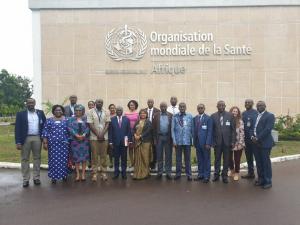New Brazzaville Road Map will accelerate health emergency risk profiling
The World Health Organization Regional Office for Africa has developed a road map that will accelerate health emergency risk profiling in countries within its African Region.
The Brazzaville Road Map was developed during a workshop at the WHO Regional Office in Brazzaville, Congo, from 14 to 18 October 2019. This groundbreaking initiative:
- establishes a risk assessment working group;
- provides improved information on the various risk assessment tools available;
- provides guidance to countries to facilitate decision-making regarding which tools to use for risk assessment in various contexts; and
- initiates the development of a comprehensive tool that will harmonize the objectives and methodologies of the risk assessment tools.
Dr Zabulon Yoti, Acting Regional Emergency Director, stated in his keynote address that “given the complexities of emergencies in the African region and climate-related events that are becoming more common, critical information from risk assessment and profiling will be invaluable in enhancing preparedness, readiness and response to health emergencies and disasters”.
The workshop included participants from all three levels (global, regional and country) of WHO as well as experts from the Food and Agriculture Organization of the United Nations and the National Disaster Management Organization of Ghana. The objective of the workshop was to strengthen technical support for developing risk profiles for health emergencies and disasters within the WHO African Region.
Topics included the basic concepts, terminology and frameworks of emergency and disaster risk management, including the disaster risk management strategy for the WHO African Region. The participants deliberated on the purpose, objectives, application, scope and challenges of the following standardized risk assessment tools currently in use in the region: the Strategic Tool for Assessing Risks; the Vulnerability, Risk Assessment and Mapping tool; the Joint Risk Assessment tool; and the Strategic Risk Assessment at Ground Crossing tool. While the tools are not mutually exclusive, they use different approaches to calculate risk, making the results incomparable. None of the tools are sufficient on their own to provide all the expected results of a comprehensive risk assessment.
Harmonizing the risk assessment process will contribute to enhancing the overall planning and capacity for the detection, prevention, preparedness and response for priority hazards.
The Brazzaville Road Map will align with the Regional Strategy for Disaster Risk Management and the Regional Strategy for Health Security and Emergencies. It will also strengthen the implementation of these strategies in the countries and facilitate the development and/or implementation of priority interventions of the National Action Plan for Health Security as part of the International Health Regulations (2005).



